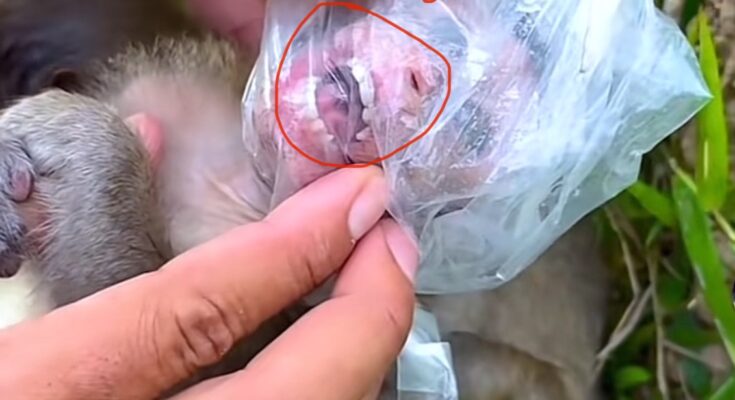In a heartbreaking incident caught on camera in a small forested area near a village in Southeast Asia, a baby monkey was seen with its face trapped inside a plastic bag for over 10 minutes. The young animal, clearly distressed, was stumbling blindly, its tiny hands clawing at the suffocating plastic. Without intervention, this innocent creature could have died — another silent victim of humanity’s plastic pollution crisis.
A Scene Too Familiar
Plastic waste has become so pervasive that even the most remote corners of the world are no longer safe for wildlife. The image of the baby monkey—barely a few months old—struggling helplessly, is a gut-wrenching symbol of how plastic waste has invaded natural habitats. The bag, most likely discarded carelessly by a human, was just one of the 5 trillion plastic items we throw into the environment every year.
For over 10 minutes, the baby monkey could not breathe properly. It staggered around, bumping into tree roots and rocks, its mother frantically trying to remove the plastic but unable to do so. Bystanders who witnessed the event finally stepped in, removing the plastic bag just in time. The baby gasped for air and clung tightly to its mother—alive, but terrified.
Plastic Kills — Quietly and Quickly
This incident is not isolated. Wildlife all over the world, from sea turtles and dolphins to elephants and birds, are regularly found dead with plastic in their stomachs or wrapped around their bodies. For primates like monkeys, the danger is particularly acute in areas where human garbage is easily accessible. Curious by nature, they often investigate food wrappers, bags, and containers — unaware of the deadly risks.
Even a few minutes with a plastic bag over the face can lead to suffocation. Unlike humans, animals cannot remove these hazards themselves, especially young ones. The baby monkey’s near-death experience is a tragic reminder of how human negligence threatens wildlife survival every day.
A Wake-Up Call for Us All
This small monkey’s ordeal may seem like a minor event in a world filled with tragedy, but it underscores a larger issue: our failure to manage waste responsibly. If something as simple as discarding a bag in a bin could save a life, why is it so difficult for so many to do so?
Communities living near forests and wildlife habitats must be educated and equipped to reduce plastic use and improve waste disposal. Governments and conservation groups must invest more in awareness campaigns and cleanup efforts. Tourists visiting natural areas should be especially mindful of what they leave behind.
The Way Forward
This baby monkey was lucky. Many others are not. The incident serves as a poignant symbol of the intersection between human carelessness and animal suffering. It’s a call to action — not just for environmentalists, but for every individual who uses plastic in daily life.
If we truly care about the planet and the creatures we share it with, we must take responsibility — not just by reacting to tragedies like this, but by preventing them in the first place.



